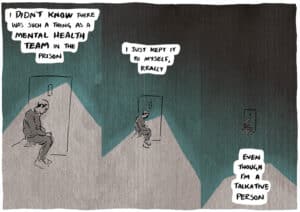Better mental health support needed
Investing in community mental health services would help to ease the pressure on the prison system by diverting more people from custody, according to a new (22 July 2025) policy paper from Centre for Mental Health and the Prison Advice and Care Trust (Pact). The report argues that an element of the £9 billion earmarked to build new prison places should be allocated to community mental health care for people in contact with the criminal justice system.
The paper warns of a mounting mental health crisis in prisons, where mental ill health is “the norm, not the exception”. Rates of self-harm in prisons have more than trebled in the last decade, from 25,843 in 2014 to 79,027 in 2024. Recent data shows that, among prisoners, 56% of men and 74% of women report having mental health problems.
The report
The joint briefing is a call to explore how the Government could use public funds differently. To investigate how the justice system could work for victims, communities, people who have committed offences, and families alike with a better understanding of mental health. To ensure investments and decisions made now make communities safer and people healthier in the long term.
In this briefing, the two organisations look at the current evidence about the mental health of people in prison and the options available to government to address people’s needs more effectively.
They explore the consequences of poor mental health in prisons, the ways in which health and justice services are working hard to address them, and some of the challenges this poses.
The briefing explores the impact of imprisonment on people’s families, including how families can often be part of the solution.
Finally, it looks at ways to relieve pressure on the prison system, for example by diverting some people from prison to community where that is safe and effective.
In the light of the Sentencing Review and reforms to the Mental Health Act in progress, the charities argue that the time is right to reimagine and rebuild a justice system that works for the common good of all – for victims, communities, people who suffer mental ill health, and the dedicated people who work in our struggling justice system.
Key findings
- Nine out of ten people in prison have at least one mental health, neurodevelopmental
or substance use problem, and rates of severe mental illness are ten times those in the
general population. - Rates of self-harm in prisons are high and rising, with the highest rates in women’s
prisons. - Prison mental health services currently support one person in seven in the prison
population. They provide vital care and support but are often overstretched because
of high levels of need and complexity. - Involving family members in providing mental health support in prisons can be
beneficial but is often limited. The reports makes a call to expand the role of families and carers in supporting prison and health care staff to care for mentally unwell patients, saying that aligns with the Mental Health Bill’s aspiration to strengthen the rights of families. - Transfers from prison to hospital for urgent treatment are still too often delayed,
sometimes by weeks and months. The report urges the Government to remove blockages in the system that currently hamper prisons’ ability to transfer patients to hospital for urgent treatment. It argues that improving step-down services for people who no longer need to be in hospital would help to free up capacity and ensure seriously unwell people get the care they need. - Community sentences with mental health treatment can divert some people from
custody. This reduces pressure on prisons and enhances their chances of successful
rehabilitation; however MHTRs continue to be underused.
Thanks to Andy Aitchison for kind permission to use the header image in this post. You can see Andy’s work here.








